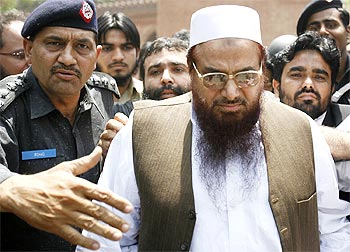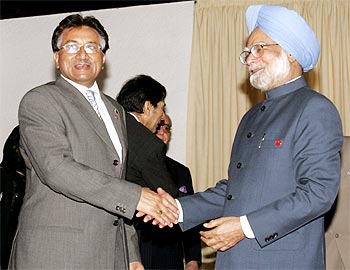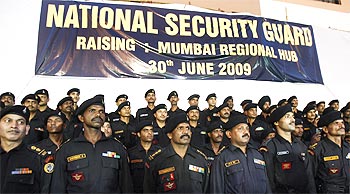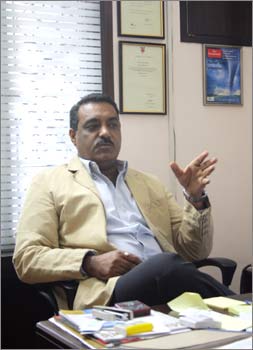Photographs: Mohsin Raza/Reuters Archana Masih
With another Pakistan-based terror outfit, the hither-to-unheard-of Lashkar e Tayiba al Alami, the role of non-State actors ensconced in India's western neighbour in fomenting terror has once again come into focus.
There have been other links to terror groups in Pakistan as well. After each trip to India, for instance, Laskhar-e-Tayiba operative David Coleman Headley, the Pakistani-origin US citizen charged with criminal conspiracy in the 26/11 Mumbai terror attack, returned to Pakistan to meet other co-conspirators and provided results of his surveillance, including oral descriptions of various locations.
A retired Pakistani Army major was also arrested for his links with Headley and Pakistan-born-Candian Tawwahur Rehman, another 26/11 accused. These developments yet again bring into focus Pakistan-based terror operatives for targeting India in deadly ways.
Maroof Raza, a former Indian Army officer and well-known security and defence analyst, gives a detailed view of the Pakistani establishment's response to the Mumbai attacks and describes how the Pakistan Army controls the country's national identity.
The author of three books on India' security concerns, his latest book Confronting Terrorism was released last month. In a candid conversation with Archana Masih, he discussed how terror had become an industry in Pakistan, the pre-eminence of the Pakistan Army in the State, and how India diplomatically lost the plot after 26/11.
The prime minister recently said that Pakistan hasn't done enough on 26/11 and India doesn't even know who to speak to since real power rests with the Army -- what options does this leave for India?
The long term agenda of the international community is to depoliticise Pakistan. It will take 10-20 years, till one or two generations of young officers grow up recognising the fact that there is a civilian leadership that they must respect.
The reason why the Pakistan military became pre-eminent is because at its creation the civilian leadership was unable to take interest in matters of foreign policy and strategy. Hence, the military became actively involved in defence purchases. India, China, the US and nuclear issues became their domain. They really call the shots on key issues that are part of Pakistan's national identity. Even when the military is not in power, issues like India, China, Afghanistan, the US, nuclear strategy are in their domain.
Civilians have repeatedly been given chances by history and they've failed to deliver in Pakistan. Asif Zardari is no better and his time is limited. In India at the time of Independence, Pandit Jawaharlal Nehru and other leaders commanded the respect of the military. The military did not feel the need to get into a confrontation with Panditji on foreign policy even after the Nehru and Krishna Menon's [then foreign minister] China blunder in 1962.
Dr Singh is a great economist, he is honest but is rather naive and misdirected on foreign policy. He got away with the nuclear deal because it was good for the country -- let's not talk about the Nuclear Supplier's Group -- the deal gave us access to technology that was denied to us in spite of us being a law-abiding country. But Dr Singh got Sharm-el-Sheikh [where India and Pakistan gave a joint statement delinking action on terror with the composite dialogue] completely wrong.
In Pakistan even on a happy day its prime minister does not have the decision-making powers as ours. In all talks with Pakistan, you must involve the army chief and the ISI, only then can you get a rubber stamp of respectability. Dr Singh should speak to all the establishment, you can't talk to one man.
In spite of international acknowledgement of the Lashkar-e-Tayiba's role in 26/11 and Pakistan's own admission of Lashkar's involvement, its leader Hafiz Sayeed still roams free?
Diplomatically we've lost the plot. With world opinion in our favour, we haven't achieved anything. Pakistan's smirk has changed into a smile ever since we have been making all concessions to them in Sharm-el-Sheikh and elsewhere. The message that's gone out to the world is that with India it will always be business as usual.
If India had effectively used all its diplomatic leverage, the goodwill of the international community and our politicians had not got very busy in trying to win the next election, we had lots in our favour but we abandoned it. The world thinks we are not serious about handling terror.
'For Pakistan terror is an industry'
Image: Former Pakistan President Pervez Musharraf with Dr Manmohan SinghPhotographs: Enrique De La Osa/Reuters
As far as action on the perpetrators of 26/11 are concerned, do you think it would have been different if Pervez Musharraf was in-charge?
Historically, Pakistan's military commanders have been shrewder politicians than their politicians. All of them are by and large of the view that one key issue should be settled in Pakistan's favour for them to move into the next phase of growth. 'Settle' means give them Kashmir. The attack on our Parliament was to take the whole Parliament hostage and then get the Government of India to grant a concession over Kashmir for the release of the politicians. The attack misfired.
The Mumbai attack was to not just hold India hostage, it was to convey a message to India that we won't allow you to grow economically unhindered because if you become too wealthy, you're not going to talk to us. We want to talk to you as one poor nation to yesterday's poor nation, so that you are willing to listen and make concessions to us. If you become wealthy, you'll say talk if you want to talk to us or we'll move on -- which is how China is dealing with the world. Pakistan saw India heading in that direction so an attack on the heart of India's business centre was to tell the world that India is not safe and to tell India that we'll hit you not only at the military camps but in the corporate sector also.
Musharraf was known to be adventurist. At his time Kargil, the Parliament attack had happened -- importantly Musharraf felt that he would have a military attack on India and then talk peace. In Musharraf's time all the terror groups were under the control of the army, now they've gone out of their control.
Therefore, to say that only the army was behind this attack is largely the truth but there is the possibility which prevents the international community and India to fully put the blame on Pakistan, which is that these could be renegade terror groups that have gone out of control. But Pakistani intelligence and military set-up cannot be absolved of the blame because their strategic aim was that if India responded militarily or even deployed its troops, then Pakistan would get a reason not to pull their troops out of the Indo-Pak border and shift them to fight the militants on the Af-Pak border who were also their proteges.
Pakistan's military keeps two sets of proteges intact, one is the Taliban and others led by Gulbuddin Hekmetyar and Jalalludin Haqquani, and the other is the Lashkar-e-Tayiba, Jaish-e-Mohammad and other groups with an anti-India focus.
After the Mumbai attack, a lot of these anti-India groups were shifted to the frontier region and began to be locally addressed as the Punjabi Taliban. After this attack the ISI was bypassed by the army and the army created a second group of minders for the terrorists, who were ex-army officers and ex-frontier force officers who had retired and settled in Peshawar, pretending to be NGOs in the day and monitoring the Taliban and other hardline groups in the night.
When Western agencies -- America in particular -- started penetrating the ISI in return for paying them the money, they found out that the ISI was not as thickly involved with the Al Qaeda and tribals in the FATA region -- because the army has created a second rung of leadership for those guys who the US and others don't know how to penetrate and where to penetrate because it is not a structured organisation.
For Pakistan terror is an industry. Dr Manmohan Singh -- who is otherwise a very honest, modest, sincere, moderate man -- for him to say after 26/11 that terror is an extension of Pakistan foreign policy was a bold statement.'The era of conventional wars is behind us'
Image: National Security Guard commandos during the opening of their new hub in MumbaiPhotographs: Punit Pranjpe/Reuters
A lot of security measures were taken after the 26/11 Mumbai attacks -- NSG hubs were opened, equipment was bought by the Mumbai police, a commando unit of the state police set up etc. In your opinion where are we now compared to then?
We are more or less where we were except there is greater awareness in the common man about what terror can do to you. There is an awakening in the corporate sector to try and create terror awareness. Our abilities to withstand another terror attack haven't improved. In terms of equipment we need to fortify India -- the police, army, navy and air force.
If the three services continue to assume that their primary role is to look for a war across the border, then quite frankly the era of conventional wars is behind us. You may be equipped with these big weapon systems but they are like elephant's teeth. You also need a rethink on the defence budget, on where the money should go. Ideally it should go for internal security.
It's not as if India does not have money, we're a country with the largest defence purchases in the world. We have a budget of 40 million dollars and out of that a midget amount, if at all, has been set aside for internal security.
There is very little synergy between the various departments of intelligence, everyone is operating in watertight compartments. If we were to have a terror attack again (this interview was conducted before the Pune terror attack of February 13, 2010) , the sequence of our responses would be as shoddy, with the exception that perhaps the NSG will fly out to the location quicker and the police is hoping that the NSG will bail them out.
Won't the NSG hubs that have been created in the four metros better the response to any terror attack?
If there is a terror attack in a city where the NSG is not present, they will still take time to get there. The NSG is not meant to be your first level of response, it is only to be activated when the police have contained the situation, then the NSG is required to give the killing blow.
In Mumbai, the police kept waiting for the NSG to arrive. The Mumbai police commissioner, the top bureaucrat and the then chief minister -- who has happily been rehabilitated with a Cabinet post -- all of them refrained from calling the army stationed in Colaba which was waiting for instructions.
Then if the army comes in on its own they'll say ki chota coup ho gaya [a mini coup has happened]. The army has been told that unless you have written instructions don't move in or it'll be blamed for having a coup. The then commanding officer had just come in from the Kashmir Valley with 150 men who were trained commandos. He could have gone in and the NSG would not have been needed.'We are too much of a democracy'
Image: Maroof RazaPhotographs: Rajesh Karkera
You mentioned how there has been no accountability after what happened in Mumbai.
What can you say when you rehabilitate the Maharashtra chief minister himself! Basically Prime Minister Manmohan Singh is too soft on terror. The (then) national security adviser is one of the heads that should have rolled. The chief minister should have been out in the wild politically but four months later he was a Cabinet minister. I would blame Sonia Gandhi, Manmohan Singh -- everybody downwards for India's plight.
Our problem is that we are too much of a democracy. This horse-trading over votes decides the fate of your citizens. Elections make no difference. Is the best of India reflected in its Cabinet? What experience does Mamta Banerjee have of running the railways? The day she becomes the chief minister of West Bengal, she'll dump the railways. Is this the commitment you expect from a Cabinet minister?
She also brings in 26 members of Parliament...
So that the Congress has an uninterrupted tenure. What have they achieved in their last tenure apart from the Indo-US nuclear deal? We're going through every five-year tenure wasting our nation's time and its future. We're just keeping the nation alive in an ICU, we're not looking at the nation as an athlete who has homed in completely to pick a medal in the Olympics.
So you think we are no safer than what we were before?
We are no safer. In terms of equipment we are badly behind time. In terms of coordination, intelligence agencies, inter-service cooperation etc it is no better today than it was a year ago. In terms of training and efficiency of policemen, there maybe a marginal improvement but nothing dramatic. The Mumbai police may not repeat the same mistakes but that doesn't mean they can handle the next terror attack.
The mindset hasn't changed, everyone is living in Disneyland hoping this will not happen again. There is too much divisive opinion on how we should proceed with Pakistan. Candlelight vigils are not going to get you anywhere.
At the end of the day it is each man for himself and God for us all. The political leadership has failed us completely. War and conflict are too serious a business to be left to politicians, to paraphrase Churchill and Clemenceau who said war is too serious a business to be left to generals. But Churchill, Clemenceau and others had done military service. They knew that there comes a time when you need to take decisions.
After 26/11 we as a nation should have gone into a huddle and prioritised that we will hit back if nothing else to give a message to Pakistan that you hit us and we hit you. That we will make our economy jump and exploit its potential fully. We should have had a five-point agenda, not a 20-year target which gives politicians too much time to maouevre. They should be given a five-year target, if they don't deliver then they should stand in front of the guillotine and say take my head.




article